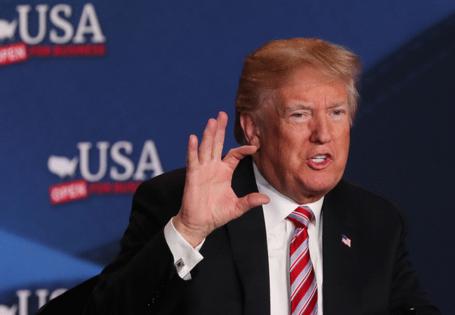Tyler Cowen: Some of Trump's tax cuts worked, but at what cost?
Published in Op Eds
Donald Trump’s 2017 Tax Cuts and Jobs Act was the biggest corporate tax cut in U.S. history. How did it affect the economy? The question has taken on increased importance now that the former president has said that, if he defeats President Joe Biden, he’d like to reduce corporate taxes even further.
Some background: Most economists have long favored lowering the corporate tax. At its previous rate of 35% — the law reduced it to 21% — the U.S. rate was one of the highest in the world. Under former President Barack Obama, there was a plan to cut it to 28%, along with closing some loopholes. The academic literature indicated that cutting the corporate tax would yield economic benefits, mostly by stimulating investment and economic growth.
Various post mortems have been performed on the Trump tax cuts over the past few years, but many of them did not have enough data on investment, or sufficiently consider how the tax cuts did not benefit all companies equally. Now there is new data and analysis, the most comprehensive yet. The results are decidedly mixed, but it’s clear that Trump’s tax cuts were effective along some margins.
One result: Total tangible corporate investment went up by about 11%. That has been a welcome shot in the arm for an economy that was by some measures suffering from an investment drought. The strong state of the Biden economy may, in part, be due to the Trump tax cuts.
The second effect of the tax cuts is more dramatic yet. The federal government’s corporate tax revenue fell by about 40%, because of both the lower tax rates and more generous expensing provisions. That decline is from a baseline of corporate tax revenue of 2.9% of GDP in 2017.
What it all means is that U.S. corporations got to keep more of their money, and the U.S. government got less. Suffice to say that there is a wide range of opinions about this trade-off. No study of the tax cut itself can resolve those disagreements. Nonetheless, it is central to any assessment of the policy.
The fiscal position of the government is weaker today than it was in 2017, so opinions on that resource reallocation to the private sector might have changed. On the more positive side, there has been a long-run increase in GDP of 0.9% — a substantial sum in an economy of more than $27 trillion. When it comes to wages, however, the tax cuts have been a disappointment, as labor income rose by less than $1,000 per employee, far less than had been predicted by the bill’s proponents.
On the third hand — I am, after all, an economist — it’s also the case that benefits from tax cuts can take up to a decade to appear. It’s possible that the pandemic and subsequent high rate of inflation interrupted the natural response to the improved corporate incentives. If true, there still might be more of a bonus from these tax cuts in the years to come.
Some conclusions about the tax cut have been more concrete. For instance, the accelerated depreciation provisions generated more investment per dollar of tax revenue than any other incentives in the bill. In contrast, the tax cuts to pass-through firms underperformed. That could be useful knowledge next time the government restructures the corporate tax system.
The data also show that foreign firms investing in the U.S. are a complement to domestic investment. That suggests that if the U.S. offers more favorable tax and regulatory treatment to foreign inflows, domestic investment will increase as well.
Ultimately, the final verdict on these tax cuts may come down to whether America can afford them. Currently the federal deficit is in the range of 6% of GDP. Americans have shown themselves fairly resistant to either spending cuts or tax hikes, so it is far from clear how the budget might move to a more sustainable long-term position. The desirability of any reduction in taxes or increase in spending may depend on what happens with the rest of the budget.
And that, in turn, depends on what happens in the November election. The cut in the corporate tax rate was permanent, but the expensing provisions started phasing out last year, and some of the other provisions will also sunset.
A re-elected Trump would try to protect one of his signature initiatives. A re-elected Biden would let it expire. It remains an open question how hard either one would fight to follow through on their promise.
____
This column does not necessarily reflect the opinion of the editorial board or Bloomberg LP and its owners.
Tyler Cowen is a Bloomberg Opinion columnist, a professor of economics at George Mason University and host of the Marginal Revolution blog.
_____
©2024 Bloomberg L.P. Visit bloomberg.com/opinion. Distributed by Tribune Content Agency, LLC.




























































Comments